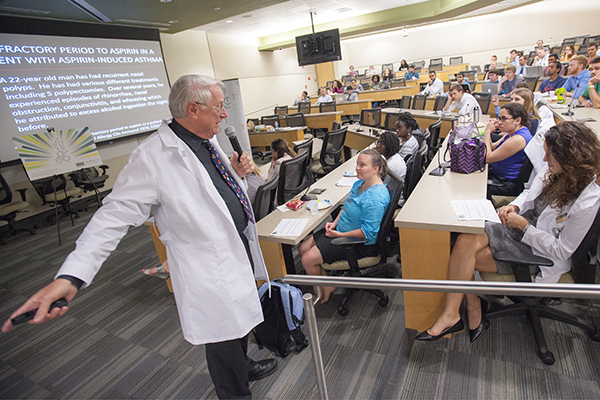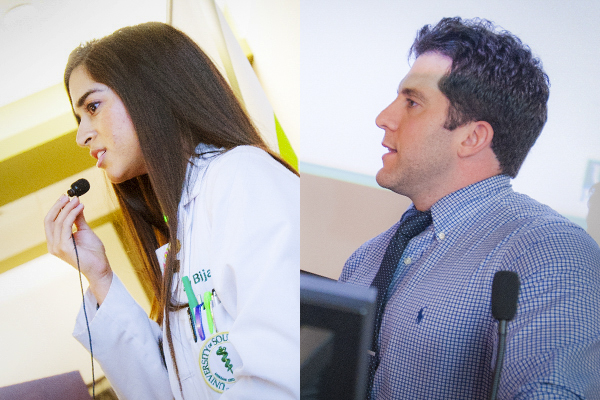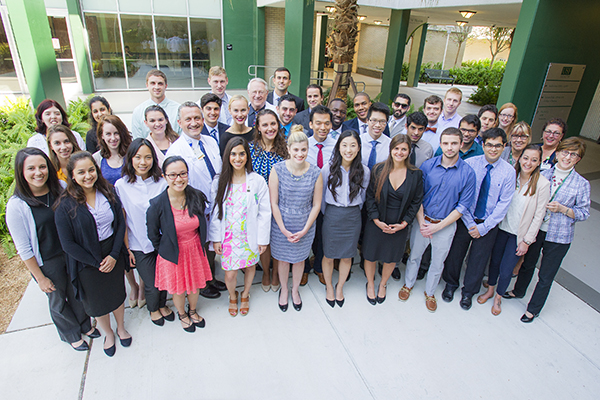Science will not move forward if today’s medical school graduates do not make research a significant part of their careers. This was the reality presented by Richard Lockey, MD, University Distinguished Health Professor, professor of medicine, pediatrics and public health, director of the USF Health Division of Allergy/Immunology, and the Joy McCann Culverhouse Chair in Allergy and Immunology. Dr. Lockey was the keynote speaker for this year’s MCOM Scholarly Concentrations Student Symposium.
“In order to keep the medical field moving forward, we need new researchers,” Dr. Lockey said. “We need people who are dedicated to research – clinical research, basic research, and integrated research. If you don’t do it, the country and science doesn’t move forward.”
Titled “My 50 Years of Fun Caring for Patients, Teaching and Research Continues,” Dr. Lockey’s talk provided lessons he has gleaned from five decades as a physician scientist – lessons that are parallels to the students’ current education.
“Medicine is about first for caring for patients, second is about continuing education, third is about being a leader in your community, and fourth is doing research,” he said. “And we who do research feel privileged because it’s fun. Yes, research is fun. It is difficult, but if you give up with the first negative experience you have you won’t move us forward.
“Research is the right thing to do, you’re going to enjoy it, and it makes you a much better physician. You are the future of the country. You are the future of medicine. Our future is with you.”
Held Nov. 4, the Student Symposium is an opportunity for the mostly second- and third-year medical students to present the preliminary research data on projects they carry across their four years of medical school.
This 7th annual symposium featured 31 presentations by medical students participating in the faculty-mentored Scholarly Concentrations Program, a college wide program that provides medical students with an elective minor in one of 11 areas, providing them with opportunities for academic endeavors in areas of special interest. The concentrations are: Biomedical Research; Health Disparities; Health Systems Engineering; Innovation, Entrepreneurship and Business in Medicine; International Medicine; Law and Medicine; Medical Education; Medical Humanities; Medicine and Gender; Nutritional Research and Health; and Public Health.
Each concentration includes elements of course work, practical application, and scholarly presentation and allows for self-directed learning, enhances interactions between students and fosters relationships between students and faculty.
Following Dr. Lockey’s address, the students presented their work. The presentations were judged, and this year’s winners are:
- Kevin Morgan, MSIII – Outstanding Clerkship Level Oral Presentation – Room B (Biomedical Research Scholarly Concentration)
- Tie: Anna Cheng, MSII, and Noah Hackney, MSII – Outstanding Pre-Clerkship Level Oral Presentation – Room B (Biomedical Research Scholarly Concentration).
- Matthew Applebaum, MSIV – Outstanding Clerkship Level Oral Presentation – Room A (Biomedical Research Scholarly Concentration)
- Kyle Kilinski, MSII – Outstanding Pre-Clerkship Level Oral Presentation – Room A (Public Health Scholarly Concentration)
- Gilbert Murimwa, MSII in the SELECT program also won Outstanding Pre-Clerkship Level Oral Presentation – Room A
All presenting students and their topics include:
Madison Collins: “Use of Axillary Lymph Node Dissection (ALND) in Patients with Micrometastatic Breast Cancer”
Paul Marcet: “The need for hormone replacement therapy after transsphenoidal surgery for pituitary apoplexy versus elective resection of pituitary adenoma”
Gilbert Murimwa: “Impact of sarcopenia on outcomes of locally advanced esophageal cancer patients treated with neoadjuvant chemoradiation followed by surgery”
Sara Bijan: “Von Hippel-Lindau Disease: A Rare Cause of Retinal Hemiangioblastoma”
Michael Hachadorian and Danielle Grossman: “Entamoeba histolytica in Khon Kaen, Thailand”
Paige Crocus and Samantha Steinberg: “Generational Differences in Medical Specialty Choice Selection of Healthcare Providers”
Dylan Lahiff and Talha Rashid: “Gender and Race Differences in Deceased Donor Hypertension for Kidney Transplantation”
Hillary McMullin: “Who’s the Chief?”
Hannah Shin: “Progressions: A Transgender Photo-Story Exhibit”
Caroline Bresnan and Sonya Bhaskar: “Advertising and Other Factors Associated with Herpes Zoster Vaccine Uptake: A Cross-sectional Survey”
Kyle Kilinski: “The Impact of Pre-Treatment MRI on Genitourinary and Gastrointestinal Toxicity After Radiation Therapy in Patients with Localized Prostate Cancer”
Nicole Wood and Anaisy Pargas: “Cervical Cancer Prevention in Rural Nicaragua: An Ambassador Model”
Ammar Alsalahi: “Exploring the use of AAV9-ADI as a possible therapeutic for Lewy Body Dementia”
Matthew Applebaum: “Try it You’ll like it: An Approach to Postoperative Antibiotics”
Rupin Singh: “Cross-disciplinary Optimization of Nano-Drug Delivery to Ovarian Carcinoma and Glioma Cells”
Zyad Asi: “PERT enzymes and cystic fibrosis”
Anna Cheng: “Mechanisms behind chromosome bridge resolution in breakage-fusion-bridge cycle”
Wei Lue Tong: “Identification of immunoglobulin V(D)J recombinations in solid tumor specimen exome files: Evidence for high level B-cell infiltrates in breast cancer”
Nupur Godbole: “Effect of Paternal Involvement and Family Dynamics on Birth Outcomes Including Low birth weight, Stillbirth, and Gestational age and Complications”
Nicole Le: “Impact of peer support on virologic failure in HIV-infected patients on antiretroviral therapy – A cluster randomized controlled trial in Vietnam”
Megan Moberg: “The effect of maternal sleep quality during pregnancy on birth outcomes including still birth, low birth weight, and gestational complications”
Patrick Mullen: “Rates of enrollment in commercial MCAT preparation courses and the perceived effectiveness of such courses”
Parth Patel: “The Effect of Maternal Education on Birth Outcomes Including Still Birth, Low Birth Weight, and Gestational complications”
Keith Zimmerman: “Effect of feedback type on perceptual learning in a visual acuity test”
James Dustin Denham: “Pseudomonas aeruginosa Bacteremia in Patients with Hematologic Malignancies”
Noah Hackney: “Outcomes of Vancomycin-Resistant vs Vancomycin-Sensitive Enterococcal Infections in Acute Myeloid Leukemia Patients, a Retrospective Cohort Study”
Mark Bender: “Surgical Stabilization of an Intramuscular Pectoralis Major Tear Utilizing Semitendinosus Allograft”
Roger Gerard: “Tumor Size and Perioperative Outcomes after Robotic-Assisted Pulmonary Lobectomy”
Danny Nguyen: “Pulmonary Lobectomy is Not Inferior to Pneumonectomy for Stage-II (N1) Non-Small Cell Lung Cancer”
Annie Hendryx: “Anti-hypertensive Treatment in Haiti”
Kevin Morgan: “Cardiovascular complications and mortality determinants in near drowning victims: A 5-year retrospective analysis”
Photos by Eric Younghans, USF Health Office of Communications.




